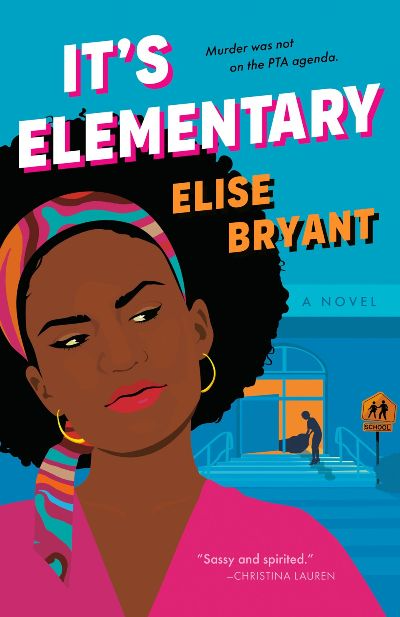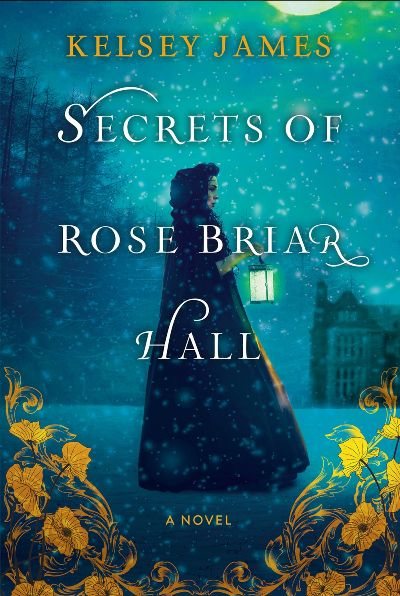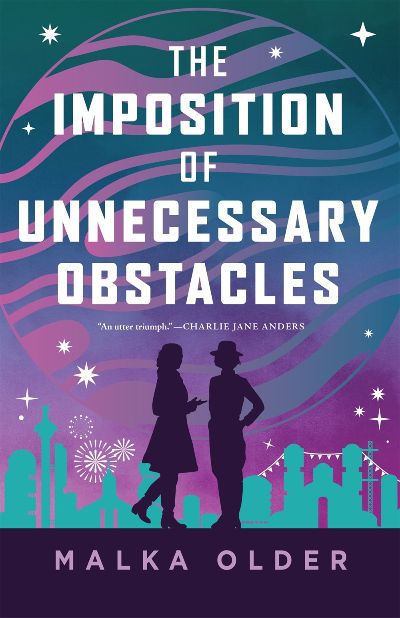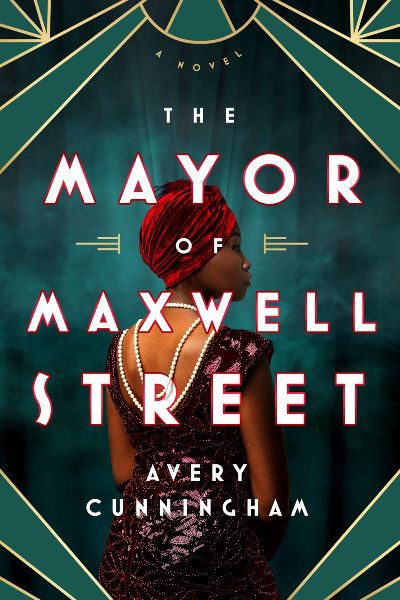Computer science professor Penny Collins has been dragged by her sister to a tag sale being run by Anthony, who’s recently deceased uncle has left him—as handsome as he is aloof—with his estate, which he is now trying to unload. Things go from bad to worse when Penny’s toddler nephew yanks open a closet door, only to have a dead body tumble out. From there, Anthony tries to avoid Penny and her 101 questions, while Penny can’t stop herself from trying to get to the facts. Or at least get to Anthony (did I mention how handsome he is?). Sooner rather than later, the two end up locked together in their own closet, and when they finally emerge, they agree to work together. Anthony, it turns out, works as a “fixer,” but one of the good guys: he doesn’t kill, he just, well, fixes things. There is a lot swirling around these two, including the missing wife of a technology billionaire—Anthony is involved—and eventually the FBI arrives on the scene. There are so many remarks from Penny about how Anthony smells, it’s quite remarkable; this could well be the first olfactory novel. In any case, I’m planning to splurge on a bottle of Tom Ford’s Eau d’Ombre Leather for when reading the next volume, which I sincerely hope comes along sooner rather than later.
Romance
Nura Khan has taken over Piyar, her grandmother Khala’s matchmaking business, which is a mix of old and new. Matchmaking is traditionally how young people in her Pakistani American community find their spouse, but Nura will only work with the prospective bride or groom, not their parents, and the young couple meets and dates before marrying. Nura grew naturally into the role; her father died before she was born and after her mother died in an accident, she went to live with her loving, successful aunt Khala, eventually taking over the Atlanta business. She loves the work, but there’s a problem: she’s single, and for a matchmaker who’s already reached the ripe age of 31, it’s not the best look. That’s why she brings Azar, her childhood friend who at one point almost became more—how she wishes it did!—to the many events involved in desi wedding celebrations. A worse problem arises when Piyar’s matches start to go terribly wrong and the business is getting trashed on social media. It’s a dangerous path to finding out who could have a grudge against Nura, one that brings in handsome doctor Azar and Nura’s lovable circle of friends and employees. Desi readers, fans of the reality shows dedicated to matchmaking, and everyone who loves a mystery and romance combo will savor YA author Saeed’s first novel for adults.
Carter’s latest novel answers the question: What if Agatha Christie wrote a rom-com? Maggie Chase writes cozy mysteries, and Ethan Wyatt writes thrillers for the same publisher. Maggie wants nothing to do with Ethan, and for some reason, he keeps calling her Marcie. Forced to fly together when a private jet takes them to a Christmas party hosted by a reclusive fan of their books, they are stunned to learn the host is none other than their favorite author, Eleanor Ashley, who inspired Maggie to start writing. Things get complicated when Eleanor vanishes, and shortly after that, murder joins the party. Maggie and Ethan are forced to trust each other since nobody else on Eleanor’s invite list appears innocent. This fast-paced novel reads like a mix of a terrific Hallmark movie and a Cary Grant movie from the 1930s. The dialogue alone is worth the price of admission. This is the perfect book for fans of Christmas romance and locked room mysteries and it’s understandable why it’s being compared to the last Knives Out movie.
Marr’s thrillers have a knack for getting inside the minds and lives of modern women, and this one continues that run, here in the high-flying (and sometimes just high) world of celebrity PR. Addison Stern is a bitchy, ruthless PR star to the stars. She’ll do anything for her clients, including ruining junior media employees who might be naive enough to try to look beneath the surface of the stars’ fake tans and Botox. She’s vying for a partnership at her firm, and finding her pharma-bro client, Phinneas Redwood, dead is not what she needs, especially when that murder is followed by other crimes that all lead investigators to Addison. She never thought she’d see the day, but she partners with her private-detective ex, Connor Windell—he’s only too happy to leave a losing streak in Las Vegas—to get to the bottom of things and save herself. The two are off on a jet-setting investigation that takes them to Monaco and other more-money-than-sense places in search of the truth. The touch of Jackie Collins here–the ridiculous riches if not the steaminess—adds a deliciously over-the-top touch to a fast-moving, satisfying whodunit.
Mavis is one busy single mom. Pearl, her seven-year-old, is smart, funny, and chatty. Her ex, who tries to be a good dad, is a musician who is regularly on tour across the country. The non-profit Mavis works for has the bad habit of skipping her over for promotions. And Trish, the incredibly bossy head of the PTA—when will a house fall on her?—tricks Mavis, as one of only a handful of Black moms at the school, to head its DEI committee. “DEI means diversity, equity, and inclusion, sure,” Mavis says. “But it also means free labor to be given willingly to fix problems we didn’t create.” The novel is barely underway when the new school principal suddenly disappears while Mavis, while walking her dog late at night, passes the school, only to see Trish loading up her car with cleaning supplies and heavy plastic bags…filled with the remains of Principal Smith? Joining forces with Jack, the “superhot” school psychologist, Mavis sets off to find the lost principal. Beautifully written and well-paced, this delightful novel explores the many friends and family who surround Mavis, the struggles she experiences, and the love that flows throughout. Elise Bryant is the NAACP Image Award-nominated author of the young adult novels Happily Ever Afters, One True Loves, and Reggie and Delilah’s Year of Falling.
Millie Turner is the envy of 1908 New York. She nabbed the catch of her season, marrying devastatingly handsome financier Charles Turner. They’ve moved to Oyster Bay, Long Island, and live in a house Millie inherited, which is now decorated too ostentatiously for her liking—there’s a taxidermied zebra!—but what Charles wants, Charles gets. Millie is nervously but happily hosting a lavish party when suddenly everything changes—she wakes up to a freezing, dark house, with the party over and the guests gone. Nobody will tell her what ’s happened, but she slowly learns that after a crime was committed at the party, she took a weeks-long “rest cure”—a drug-induced sleep prescribed at her husband’s wishes. Millie has had a terrible upset, they say, and since hysteria “can lead to immoral behavior [and] make you ungovernable,” there’s no time to waste: she must enter an institution. Thus begins Millie’s fight for her life. The first-person narrative, told from the young woman’s point of view, is both shocking and exciting, moving from grand ballrooms to flophouses and from shady business dealings to the honesty of pure love. A lengthy court battle will keep readers deliciously on edge in James’s (The Woman in the Castello, 2023) shocking and gripping drama.
Readers in search of a classic mystery need look no further, and if you have a fascination with San Francisco, as I do, then you’re doubly in luck. Capri Sanzio is the granddaughter of one of the City’s most famous serial killers: William “Overkill Bill” Sanzio, who’s now deceased. So named because “he bashed his three victims on the head, stabbed them to death, then sliced their throats after the fact.” A thorough kind of guy. Capri’s parents are shamed by their relationship to Bill, but Capri—who believes he was innocent—has a far more complicated response: she runs a highly successful business providing tours related to San Francisco’s serial killers (with herself, as Bill’s granddaughter, one of the prime attractions). But suddenly there’s a copycat of Bill murdering San Francisco women—one of whom is closely related to Capri—and the cops have made it clear that Capri or her daughter (herself a doctoral student in criminology) are their two prime suspects. With excursions from high society to the working class, and richly detailed portraits of San Francisco, this fascinating, fast-paced novel should find a broad readership. More, please?
At first, Finding Mr. Write reads like hearty rom-com fare: Daphne McFadden, a struggling writer who can’t get an agent, hires a dishy man to pose as the author of her book. She wants to hate “Zane Remington” but can’t, and complications ensue, not to mention increasingly lingering looks. While the enjoyable rom-com type misunderstandings and drama continue throughout the book, there’s also more here. Crime and mystery come into play when Daphne’s publisher and the book’s rabid fans get ever closer to finding out that Zane isn’t really the author of the wildly popular “dark zombie thriller with a teen girl protagonist,” and Daphne worries about her legal future. There’s also a lot to absorb about the economics, biases, and general messed-up-edness of the publishing industry, with an overworked publicist, one in a long string of underpaid young women, one of the tale’s quiet heroes. This well-plotted look at a maybe-romance and the bizarro world writers inhabit is a fun mix of mystery and romance, and well worth a read.
Whenever you love a book—that would be me and the first book in this series, The Mimicking of Known Successes—you can only approach the next installation with some trepidation. So I’m happy to report that this book more than lives up to my expectations—although it’s important to read the books in order. It’s set against a rather simple mystery: 17 students and staff members are missing from Valdegeld, the Oxbridge-like university where Pleiti is a professor. This is a space opera and a detective story, a romance and a cozy mystery, with the investigation led by Mossa, Pleiti’s lover and a detective, who in this story explicitly asks Pleiti for her help. Set in part on Giant, the huge rings that surround Jupiter and where many humans have settled, this narrative includes a lengthy trip to far-off Io, one of Jupiter’s moons. The pleasures in this book are many. There’s the growing relationship between the two women, especially Pleiti’s worries that Mossa may not have feelings as strong as she does. There’s the brilliant world-building, with special attention to the far-off settlements the two women seek out, revealing the fascinating means of travel and the many smaller, human communities scattered across the vast planet. Finally, there are ruminations from Pleiti about the aim of returning to Earth, her research area, and the hints of political dissent. Brilliant on all counts.
Nelly Sawyer’s father is a Kentucky horse breeder and the richest Black man in America. The family is in prohibition-era Chicago for Nelly’s coming out, when she’s expected to meet the country’s most eligible young Black men and find one to marry. She doesn’t fit in at the events, disdains the whole charade, and just wants to be alone to grieve the recent death of her brother. She’s also eager to pursue a career in journalism, not easy for a woman, let alone a Black woman who’s been raised in genteel isolation. Outside the cotillion and other events are no better, as white Chicagoans take the young woman for a servant. Nelly is soon distracted, though, when she’s surprised by potential love interests: Jay Shorey, a mysterious, beautifully dressed speakeasy manager, and the more suitable, at least in society’s view, Tomás Escalante y Roche, a Marquis who is this season’s catch. When Nelly is challenged to find and identify the dangerous Mayor of Maxwell Street to keep the newspaper job she’s threatened with losing, both men and Nelly herself are thrown into a vicious game of deceit that adds high suspense and sometimes terrible danger to the politics-laden season. An evocative and thought-provoking debut, and just look at that cover!










